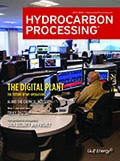
July 2020
Special Focus: The Digital Plant
With the increasing volatility of the oil and gas markets (involving price fluctuations and oil demand uncertainties) and stricter environmental constraints, a new normal for the world is being built right in front of us.
The term “industrial transformation” is sometimes used to describe digital transformation in plants, factories, mills and other industrial environments.
Turnarounds are regarded as a necessary evil by most of the hydrocarbon processing industry.
Years of production have accumulated rich data assets throughout the chemical process industry (CPI).
A lot of what is written in the business media today about digital transformation—and there is certainly no shortage of it—fails to focus on what digitalization means as a practical process that enables deep, lasting organizational success.
Over the past 100 yr, a number of technological advances and process improvements have dramatically changed how the oil and gas industry finds, produces and refines petroleum.
Environment and Safety
Under the National Fire Protection Association (NFPA) definition, a BMS includes the field devices, logic systems and final control elements dedicated to combustion safety and operator assistance in the starting and stopping of fuel preparation and burning equipment.
Process Engineering
Estimating flare loads for a greenfield facility is often a challenging activity in the front end design phase.
Sustainability
Demands for sustainability are pervasive and are mandated, legislated or strongly encouraged in different social, industrial and political segments.
These are extraordinary days as we collectively work to contain the COVID-19 virus.
On January 1, new rules for sulfur emissions on marine bunker fuel came into force.
Water Management
The authors’ previous article, “Advanced cooling tower water treatment,” published in the June issue of <i>Hydrocarbon Processing</i>, outlined modern chemical treatment methods for scale and corrosion control in cooling towers and associated cooling systems, which are integral components of refineries, petrochemical plants and similar facilities.
Engineering and Construction
Modularization has been discussed extensively as a means to facilitate the construction of significant projects.
Columns
Each year, <i>Hydrocarbon Processing</i> hosts events to bring together professionals in the oil and gas industry to share ideas and knowledge on the latest advancements in processing technologies and operations.
An Italian company is among those that design and build industrial machinery for the tissue industry.
Among numerous emerging technologies in the process industries, the digital twin is the most powerful and disruptive.
<i>Hydrocarbon Processing</i> was pleased to speak with executives Peter Herweck (PH) and Chris Dartnell (CD) of Schneider Electric.
It is no secret that the oil and gas sector has eyed the advantages that can be gained from remote operations as it seeks to improve both operational efficiency and safety.
Over the past 5 yr, the energy industry has been forced to navigate highly volatile conditions, including unstable economics, increased sustainability concerns and a shortage of experienced leaders to succeed those approaching retirement.
Trends and Resources
In the May issue of <i>Hydrocarbon Processing</i>, the editors proposed a two-part question to gauge how our readers were adjusting to “work-from-home” initiatives put in place due to the COVID-19 virus.
The petrochemical industry relies on an extensive supply chain system to bring products and services to competitive markets.

- INEOS receives €300-million grant to rejuvenate and decarbonize its Lavera plant 2/19
- AGC Vinythai commissions expanded chlor-alkali plant and e-BiTAC electrolyzers from thyssenkrupp nucera 2/19
- BASF launches AdBlue GE (green electricity) to decarbonize mobility value chain 2/19
- Carbon Neutral Fuels select Johnson Matthey, bp and Honeywell UOP technologies for UK SAF plant 2/19
- ExxonMobil starts operations on second carbon capture project in Louisiana (U.S.) 2/19
- Pall introduces two new technologies to reduce CAPEX and TCO in oil and gas processing 2/19




